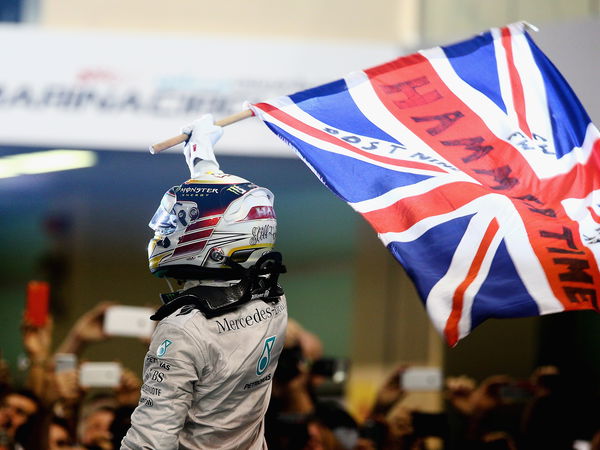
via Getty
ABU DHABI, UNITED ARAB EMIRATES – NOVEMBER 23: Lewis Hamilton of Great Britain and Mercedes GP celebrates in Parc Ferme after winning the World Championship and the Abu Dhabi Formula One Grand Prix at Yas Marina Circuit on November 23, 2014 in Abu Dhabi, United Arab Emirates. (Photo by Clive Mason/Getty Images)

via Getty
ABU DHABI, UNITED ARAB EMIRATES – NOVEMBER 23: Lewis Hamilton of Great Britain and Mercedes GP celebrates in Parc Ferme after winning the World Championship and the Abu Dhabi Formula One Grand Prix at Yas Marina Circuit on November 23, 2014 in Abu Dhabi, United Arab Emirates. (Photo by Clive Mason/Getty Images)
Lewis Hamilton has outscored his idol Ayrton Senna in some key Formula 1 statistics in 2017. That includes Championship titles and pole position tally. But achieving the sort of legacy that Senna did seems impossible for him – and it’s not hard to see why. In Formula One’s modern era, the Lewis Hamilton legacy is growing stronger.

ADVERTISEMENT
Article continues below this ad
Greatness divides opinion, but then over time, opinions soften and the darker sides of the greats fade. In motorsport, a tragedy turns a “great” into a legend. It adds to their legacy. In Formula One such example include the late James Hunt, Gilles Villeneuve and Ayrton Senna, and the seriously injured Michael Schumacher.
Perceptions change in such circumstances. An old saying springs to mind: ‘you don’t know what you have until it’s gone’. Lewis Hamilton is the living example of this phenomenon. But no driver should have to die to be fully appreciated.
Like all F1 legends who had their haters, the Hamilton legacy will eventually outlive his dark side. The question remains though: why is true appreciation in his time so difficult to achieve?
The answer is that because he is Lewis Hamilton. It doesn’t matter how good he is, or what good he does, he will always be something of an anti-hero.
Despite being the most successful British driver, heck the most successful F1 driver if you look at him from a certain statistical angle, the appreciation he gets does not match what he’s due.
Stats can’t buy love, though. And pondering Hamilton’s divisive character is an exhausting exercise.

Formula One is a big political, corporate and boring world away from the track. Hamilton, as Hunt, Villeneuve, and Senna did decades ago, stands out from that. He lives a star-studded lifestyle, very much the opposite of the likes of Sebastian Vettel or Kimi Raikkonen. He’s generating a devoted following through his social media activity and mingles with the great and good of celebrity culture. His involvement with multiple charities also suggests a genuine desire to use his profile to give back.
However, instead of being loved for it, it’s a case of resentment against him. He’s different, but with him, it’s a bad thing. It’s not without cause though. Hamilton’s taste in fashion, his ever-growing tattoos, nose and earring blings align him more towards a rich hippie image than a sophisticated gentleman of a sophisticated sport. And for his bizarre choices, Hamilton himself is to blame. But that’s not the point. The point is he can be who he wants to be. That’s his prerogative. It’s a matter of issue when his off-track activities come in the way of accepting his on-track greatness.

On track or off it, Hamilton rubs off people in a bad way. But that’s nothing new. In fact, every other so-called great driver had been accused of the same thing in their days. It’s just with those from the past, the grievances are conveniently ignored over time. As if their legacy has been wiped off of their dirty instances.
Hunt punched a marshal, Villeneuve was capable of driving extremely irresponsibly.
What if any of the present day drivers had done something so irresponsible? Verstappen has been involved in battles akin to Villeneuve’s at Dijon with Rene Arnoux – with last-minute lunges, wheel-banging and flouting of the track limits. Verstappen has faced the ire of many for it, but Gilles was a legend!

And Raikkonen, a driver revered for being ‘aloof’, is often deliberately disengaged with fans and downright rude and difficult at times. His legacy is already intact though.
Some people are just popular. Some people just aren’t. As the disinterest in the phenomenal achievements of Red Bull and Vettel proved, it’s not just Hamilton who has suffered in recent times. And it happens in other sports too – witness the constant derision of England and Manchester United’s record-breaking footballer Wayne Rooney. A statistical marvel does not always translate into a popular figure.
He’s racked up the third-largest number of starts of any Brit, behind Jenson Button and David Coulthard, and won comfortably more races than the two ahead of him in that list. Hamilton has more wins, more poles, more podiums and more fastest laps than any other British F1 driver.
Schumacher’s jaw-dropping return of 91 wins, might end up being out of reach. If so, it doesn’t matter. Hamilton doesn’t need to go down as the very best; he’s already guaranteed himself a place among the most illustrious company.
Still, it’s not enough. Hamilton has devoted fans, of course – most drivers do. And he splits opinion in the same vein as Senna or Schumacher. But he will never be loved. Not like those he stands alongside in the pantheon of greats.
Perhaps the problem also lies in how he has achieved his success. While Schumacher had already won two titles by the time he joined Ferrari, 72 of his 91 wins came in red. For a decade, he carved F1 in his own image.

The same goes for Senna (who won 35 times with McLaren), Nigel Mansell (28 wins with Williams) and Jim Clark (25 with Lotus). Put on your rose-colored glasses and you’ll immediately associate one of those drivers with the team they won the most with.
Will the same go for Hamilton? That he has won three titles and 41(and still continuing) grand prix with Mercedes compared to one title and 21 races with McLaren should, in theory, leave a legacy bathed in a hue of silver. But, barring his initial exploits in karting, his formative years and his explosive entrance to F1 came with McLaren. That connection carries more emotional weight.
It could just be a modern thing. Hamilton’s problem applies to Vettel – record after record shattered, and all people could do was find things to complain about. A spoiled boring brat, who has an annoying single-finger salute when he wins.
Pretty much all of Vettel’s success has come with one team. He won 39 times in Red Bull colours (2008 Italian Grand Prix victory with Toro Rosso included), but that partnership didn’t exactly pull at the heartstrings of F1 fans.
It’s hard to see Vettel and the RB9 remembered with the same romantic notion of Senna and an MP4/4, despite the obvious similarities – both were marriages of an exciting sponsor, design excellence and prodigious driving talent.
One-team drivers have always been rare, though. It’s the mark they make on their era, and what they leave behind, that matters most. And arguably he’s the most significant driver of his generation.
He is not without his flaws. There have been major on-track gaffes – beaching it in the gravel at Shanghai as a rookie in 2007, rear-ending Raikkonen in the Montreal pitlane in ’08, chopping across Kamui Kobayashi at Spa in 2011 during a run of, by his standards, frustratingly below-par performances.
Off-track, he courts attention for the ‘wrong’ reasons. Remember him tweeting telemetry from a team briefing. Who’ll forget the spraying champagne directly at a woman stood on the podium debacle. There was the storm-in-a-teacup Snapchat furore last year in Japan

Spot the trend – big or small, talking about Hamilton is a regular thing. But it means he has developed into the closest thing F1 has to a genuine global megastar, not just a superb driver. Like Senna, he is one of precious few to have transcended his sport. And the similarities with the man Hamilton has always proudly drawn inspiration from continue.
Both have had moments of public unprofessionalism – for Hamilton’s ‘cap toss’ at Rosberg, or comments in the wake of Rosberg’s retirement, there’s Senna’s candid criticism of the returning Alain Prost in the 1992 Portuguese GP press conference.
Over the years he has grown in maturity like a wine that gets better with age. But he still has a long way to go especially in the wake of his recent criticism of Rosberg. Taking potshots at Rosberg right after winning his 4th title left a bad taste in the mouth of even his fans. It gave away the fact that perhaps Hamilton is still fighting a mind game with Rosberg who has already left the game on his own terms. So in a way Hamilton is fighting himself only. To be really great he needs to rise above this hate.
Hamilton’s as important to his era as Senna was to his, or any of the true giants of racing have been. He ‘gets it’ when it comes to embracing fans, he isn’t afraid to speak his mind or make his own mistakes and is not afraid to live the life he wants to. The shackles that seem to restrict the modern professional racing driver don’t seem to apply to him.
In short, Hamilton is the driver most F1 fans say they want. They want a swashbuckling, he-who-dares talent behind the wheel, capable of being an outspoken, honest individual in front of the camera and a colorful character away from the track.

Yet he’s an inhabitant of purgatory; recognized as a brilliant driving talent but often a poorly thought-of champion.
A small consolation is that the pointless irritations Hamilton provokes will, like they always do, eventually fade. The legacy he’ll leave when that happens will be immense.
ADVERTISEMENT
Article continues below this ad
So perhaps 20 years down the line, you, me and everyone else will have forgotten the things we deride him today for. What I’m sure of is that in the future my kids, if they follow Formula 1, will idolize Hamilton in the same way I idolize Senna today.
And that will be the Lewis Carl Davidson Hamilton legacy.
ADVERTISEMENT
Article continues below this ad

ADVERTISEMENT
ADVERTISEMENT
ADVERTISEMENT
